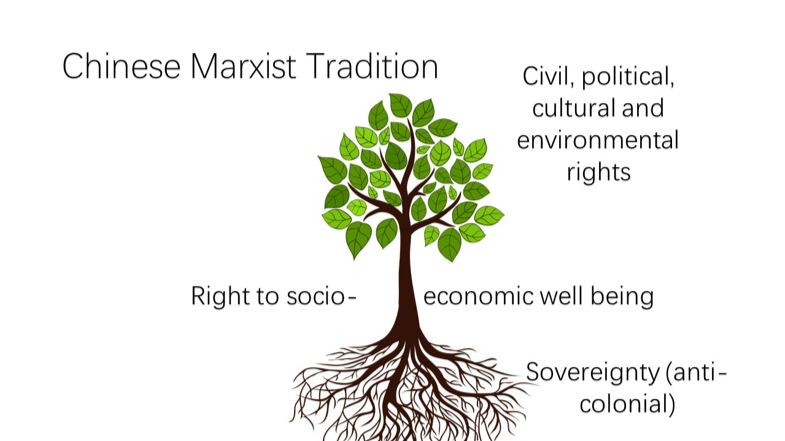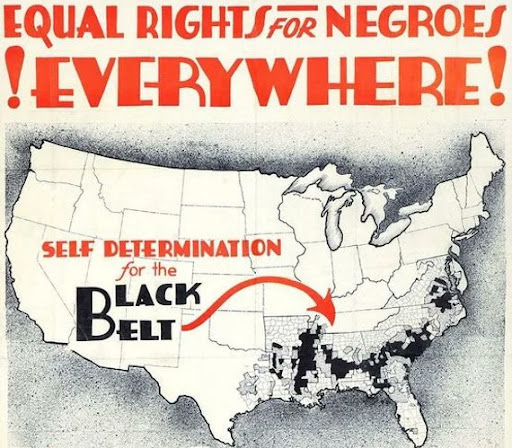More languages
More actions
(Image) Tag: Visual edit |
(Stalin quote) Tag: Visual edit |
||
| (One intermediate revision by the same user not shown) | |||
| Line 1: | Line 1: | ||
[[File:Losurdo tree.png|thumb|The [[Marxism|Marxist]] approach to [[human rights]] is grounded in self-determination.]] | |||
[[File:CPUSA black belt poster.png|thumb|[[Communist Party of the United States of America|CPUSA]] poster from 1932 calling for self-determination for Africans in the [[United States of America|United States]]]] | [[File:CPUSA black belt poster.png|thumb|[[Communist Party of the United States of America|CPUSA]] poster from 1932 calling for self-determination for Africans in the [[United States of America|United States]]]] | ||
'''Self-determination''' is the right of a [[nation]] to determine its own future and resist external political or cultural interference. It may consist of autonomy or [[federalism]] within a larger state but also includes the right to full secession and independence.<ref>{{Citation|author=[[Joseph Stalin]]|year=1913|title=Marxism and the National Question|chapter=The National Movement|mia=https://www.marxists.org/reference/archive/stalin/works/1913/03a.htm#s2}}</ref> | '''Self-determination''' is the right of a [[nation]] to determine its own future and resist external political or cultural interference. It may consist of autonomy or [[federalism]] within a larger state but also includes the right to full secession and independence.<ref>{{Citation|author=[[Joseph Stalin]]|year=1913|title=Marxism and the National Question|chapter=The National Movement|mia=https://www.marxists.org/reference/archive/stalin/works/1913/03a.htm#s2}}</ref> | ||
[[Joseph Stalin|Stalin]] argued that certain specific instances of self-determination may be progressive or reactionary depending on content:{{Quote|This does not mean, of course, that the [[proletariat]] must support every [[nationalism|national movement]], everywhere and always, in every individual concrete case. It means that support must be given to such national movements as tend to weaken, to overthrow [[imperialism]], and not to strengthen and preserve it. Cases occur when the national movements in certain oppressed countries came into conflict with the interests of the development of the proletarian movement. In such cases support is, of course, entirely out of the question. The question of the rights of nations is not an isolated, self-sufficient question; it is a part of the general problem of the proletarian revolution, subordinate to the whole, and must be considered from the point of view of the whole. In the forties of the last century [[Marx]] supported the national movement of the [[Poland|Poles]] and [[Hungary|Hungarians]] and was opposed to the national movement of the [[Czechia|Czechs]] and the South Slavs. Why? Because the Czechs and the South Slavs were then "reactionary peoples," "[[Russian Empire (1721–1917)|Russian]] outposts" in Europe, outposts of [[absolutism]]; whereas the Poles and the Hungarians were "revolutionary peoples," fighting against absolutism.|[[Joseph Stalin]]|[https://www.marxists.org/reference/archive/stalin/works/1924/foundations-leninism/ch06.htm The Foundations of Leninism: The National Question]|1924}} | |||
== References == | == References == | ||
[[Category:Marxist theory]] | [[Category:Marxist theory]] | ||
Latest revision as of 18:00, 6 April 2024


Self-determination is the right of a nation to determine its own future and resist external political or cultural interference. It may consist of autonomy or federalism within a larger state but also includes the right to full secession and independence.[1]
Stalin argued that certain specific instances of self-determination may be progressive or reactionary depending on content:
This does not mean, of course, that the proletariat must support every national movement, everywhere and always, in every individual concrete case. It means that support must be given to such national movements as tend to weaken, to overthrow imperialism, and not to strengthen and preserve it. Cases occur when the national movements in certain oppressed countries came into conflict with the interests of the development of the proletarian movement. In such cases support is, of course, entirely out of the question. The question of the rights of nations is not an isolated, self-sufficient question; it is a part of the general problem of the proletarian revolution, subordinate to the whole, and must be considered from the point of view of the whole. In the forties of the last century Marx supported the national movement of the Poles and Hungarians and was opposed to the national movement of the Czechs and the South Slavs. Why? Because the Czechs and the South Slavs were then "reactionary peoples," "Russian outposts" in Europe, outposts of absolutism; whereas the Poles and the Hungarians were "revolutionary peoples," fighting against absolutism.
— Joseph Stalin, The Foundations of Leninism: The National Question, 1924
References[edit | edit source]
- ↑ Joseph Stalin (1913). Marxism and the National Question: 'The National Movement'. [MIA]
